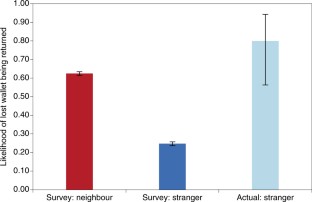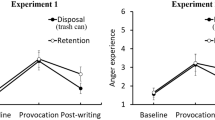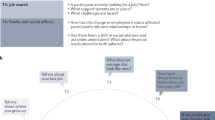Abstract
Valid and reliable self-report happiness scales have prompted a wellspring of research into the causes and consequences of human happiness, allowing researchers from across the social sciences to empirically address questions that were previously treated more theoretically in the social sciences, religion and philosophy. As this body of knowledge accumulates, we see a need for the study of happiness to be more social in both content and methodology. Specifically, we argue for a social science of happiness that further recognizes the importance of social connection and prosocial action for human well-being, and invests in greater collaboration across all disciplinary boundaries, especially among social scientists and policymakers. As a larger and stronger social science of happiness emerges, it both requires and is supported by a corresponding shift in policy from identifying and fixing problems to finding positive ways to promote well-being.
This is a preview of subscription content, access via your institution
Access options
Access Nature and 54 other Nature Portfolio journals
Get Nature+, our best-value online-access subscription
$29.99 / 30 days
cancel any time
Subscribe to this journal
Receive 12 digital issues and online access to articles
$119.00 per year
only $9.92 per issue
Buy this article
- Purchase on Springer Link
- Instant access to full article PDF
Prices may be subject to local taxes which are calculated during checkout

Similar content being viewed by others
Change history
19 March 2018
In the version of this Perspective originally published, both authors were incorrectly indicated as being at both affiliations 1 and 2. However, John F. Helliwell is only affiliated with the 1University of British Columbia and Lara B. Aknin is only affiliated with 2Simon Fraser University. This has now been corrected.
References
McMahon, D. M. Happiness: A History (Atlantic Monthly Press, New York, NY, 2006).
Diener, E., Oishi, S. & Tay, L. Advances in subjective well-being research. Nat. Hum. Behav. https://doi.org/10.1038/s41562-018-0307-6 (2018).
Diener, E. Subjective well-being. Psychol. Bull. 95, 542–575 (1984).
Kahneman, D., Krueger, A. B., Schkade, D. A., Schwarz, N. & Stone, A. A. A survey method for characterizing daily life experience: the day reconstruction method. Science 306, 1776–1780 (2004).
Killingsworth, M. A. & Gilbert, D. T. A wandering mind is an unhappy mind. Science 330, 932–932 (2010).
Diener, E. & Seligman, M. E. Very happy people. Psychol. Sci. 13, 81–84 (2002).
Helliwell, J. F., Huang, H. & Harris, A. in New and Enduring Themes in Development Economics (eds Ray, T., Somanathan, E. & Dutta, B.) 3–40 (World Scientific, Singapore, 2009).
Maslow, A. H. A theory of human motivation. Psychol. Rev. 50, 370–396 (1943).
Helliwell, J. F. & Barrington‐Leigh, C. P. Measuring and understanding subjective well‐being. Can. J. Econ. 43, 729–753 (2010).
Helliwell, J. F. & Wang, S. Weekends and subjective well-being. Soc. Indic. Res. 116, 389–407 (2014).
Helliwell, J. F. & Wang, S. How was your weekend? How the social context underlies weekend effects in happiness and other emotions for US workers. PLoS ONE 10, e0145123 (2015).
Baumeister, R. F. & Leary, M. R. The need to belong: desire for interpersonal attachments as a fundamental human motivation. Psychol. Bull. 117, 497–529 (1995).
Ryan, R. M. & Deci, E. L. Self-determination theory and the facilitation of intrinsic motivation, social development, and well-being. Am. Psychol. 55, 68–78 (2000).
Helliwell, J. F., Huang, H. & Wang, S. in The Oxford Handbook of Social and Political Trust (ed. Uslander, E. M.) 409–446 (Oxford Univ. Press, New York, NY, 2017).
Coan, J. A., Schaefer, H. S. & Davidson, R. J. Lending a hand: social regulation of the neural response to threat. Psychol. Sci. 17, 1032–1039 (2006).
Medalie, J. H. & Goldbourt, U. Angina pectoris among 10,000 men: II. Psychosocial and other risk factors as evidenced by a multivariate analysis of a five-year incidence study. Am. J. Med. 60, 910–921 (1976).
Cohen, S., Doyle, W. J., Skoner, D. P., Rabin, B. S. & Gwaltney, J. M. Social ties and susceptibility to the common cold. JAMA 277, 1940–1944 (1997).
Cohen, S., Doyle, W. J., Turner, R., Alper, C. M. & Skoner, D. P. Sociability and susceptibility to the common cold. Psychol. Sci. 14, 389–395 (2003).
Aldrich, D. P. Social, not physical, infrastructure: the critical role of civil society after the 1923 Tokyo earthquake. Disasters 36, 398–419 (2012).
Yamamura, E., Tsutsui, Y., Yamane, C., Yamane, S. & Powdthavee, N. Trust and happiness: comparative study before and after the Great East Japan Earthquake. Soc. Indic. Res. 123, 919–935 (2015).
Aldrich, D. P. The externalities of strong social capital: post-tsunami recovery in Southeast India. J. Civ. Soc. 7, 81–99 (2011).
Miller, D. T. The norm of self-interest. Am. Psychol. 54, 1053–1060 (1999).
Fehr, E. & Schmidt, K. M. Fairness, incentives, and contractual choices. Eur. Econ. Rev. 44, 1057–1068 (2000).
Hobbes, T. in Classics of Moral and Political Theory (ed. Morgan, M.) 575 (Hackett Publishing Company, Indianapolis, IN/Cambridge, MA, 2011).
Zaki, J. & Mitchell, J. P. Intuitive prosociality. Curr. Dir. Psychol. Sci. 22, 466–470 (2013).
Brownell, C. A. Early development of prosocial behavior: current perspectives. Infancy 18, 1–9 (2013).
Warneken, F. & Tomasello, M. Altruistic helping in human infants and young chimpanzees. Science 311, 1301–1303 (2006).
Warneken, F., Hare, B., Melis, A. P., Hanus, D. & Tomasello, M. Spontaneous altruism by chimpanzees and young children. PLoS Biol. 5, e184 (2007).
Hepach, R., Haberl, K., Lambert, S. & Tomasello, M. Toddlers help anonymously. Infancy 22, 130–145 (2017).
Hepach, R. Prosocial arousal in children. Child Dev. Perspect. 11, 50–55 (2017).
Hepach, R., Vaish, A. & Tomasello, M. Young children are intrinsically motivated to see others helped. Psychol. Sci. 23, 967–972 (2012).
Garon, N., Bryson, S. E. & Smith, I. M. Executive function in preschoolers: a review using an integrative frame-work. Psychol. Bull. 134, 31–60 (2008).
Hamlin, J. K., Wynn, K. & Bloom, P. Social evaluation by preverbal infants. Nature 450, 557–559 (2007).
Hamlin, J. K., Wynn, K. & Bloom, P. Three‐month‐olds show a negativity bias in their social evaluations. Dev. Sci. 13, 923–929 (2010).
List, J. A. Why economists should conduct field experiments and 14 tips for pulling one off. J. Econ. Perspect. 25, 3–15 (2011).
Brethel-Haurwitz, K. M. & Marsh, A. A. Geographical differences in subjective well-being predict extraordinary altruism. Psychol. Sci. 25, 762–771 (2014).
Koo, M. & Fishbach, A. Giving the self: increasing commitment and generosity through giving something that represents one’s essence. Soc. Psychol. Personal. Sci. 7, 339–348 (2016).
Henrich, J. et al. “Economic man” in cross-cultural perspective: behavioral experiments in 15 small-scale societies. Behav. Brain Sci. 28, 795–815 (2005).
Bouwmeester, S. et al. Registered replication report: Rand, Greene, and Nowak (2012). Perspect. Psychol. Sci. 12, 527–542 (2017).
Rand, D. G. Reflections on the time-pressure cooperation registered replication report. Perspect. Psychol. Sci. 12, 543–547 (2017).
Rand, D. G., Greene, J. D. & Nowak, M. A. Spontaneous giving and calculated greed. Nature 489, 427–430 (2012).
Yamagishi, T. et al. Response time in economic games reflects different types of decision conflict for prosocial and proself individuals. Proc. Natl Acad. Sci. USA 114, 6394–6399 (2017).
Crockett, M. J., Kurth-Nelson, Z., Siegel, J. Z., Dayan, P. & Dolan, R. J. Harm to others outweighs harm to self in moral decision making. Proc. Natl Acad. Sci. USA 111, 17320–17325 (2014).
Harbaugh, W. T., Mayr, U. & Burghart, D. R. Neural responses to taxation and voluntary giving reveal motives for charitable donations. Science 316, 1622–1625 (2007).
Moll, J. et al. Human fronto-mesolimbic networks guide decisions about charitable donation. Proc. Natl Acad. Sci. USA 103, 15623–15628 (2006).
Park, S. Q. et al. A neural link between generosity and happiness. Nat. Commun. 8, 15964 (2017).
Dunn, E. W., Aknin, L. B. & Norton, M. I. Spending money on others promotes happiness. Science 319, 1687–1688 (2008).
Dunn, E. W., Aknin, L. B. & Norton, M. I. Prosocial spending and happiness: Using money to benefit others pays off. Curr. Dir. Psychol. Sci. 23, 41–47 (2014).
Aknin, L. B. et al. Prosocial spending and well-being: cross-cultural evidence for a psychological universal. J. Pers. Soc. Psychol. 104, 635–652 (2013).
Aknin, L. B., Broesch, T., Hamlin, K. J. & Van de Vondervoort, J. W. Prosocial behaviour leads to happiness in a small-scale rural society. J. Exp. Psychol. Gen. 144, 788–795 (2015).
Aknin, L. B., Van de Vondervoort, J. W. & Hamlin, J. K. Positive feelings reward and promote prosocial behavior. Curr. Opin. Psychol. 20, 55–59 (2018).
Aknin, L. B., Hamlin, J. K. & Dunn, E. W. Giving leads to happiness in young children. PLoS ONE 7, e39211 (2012).
Helliwell, J. F., Huang, H. & Wang, S. in WorldHappiness Report 2017 (eds Helliwell, J. F., Layard, R. & Sachs, J.) Ch. 2 (Sustainable Development Solutions Network, 2017).
Warneken, F. & Tomasello, M. Extrinsic rewards undermine altruistic tendencies in 20-month-olds. Dev. Psychol. 44, 1785–1788 (2008).
Lepper, M. R., Greene, D. & Nisbett, R. E. Undermining children’s intrinsic interest with extrinsic reward: a test of the “overjustification” hypothesis. J. Pers. Soc. Psychol. 28, 129–137 (1973).
von Dawans, B., Fischbacher, U., Kirschbaum, C., Fehr, E. & Heinrichs, M. The social dimension of stress reactivity: acute stress increases prosocial behavior in humans. Psychol. Sci. 23, 651–660 (2012).
Pistrang, N., Jay, Z., Gessler, S. & Barker, C. Telephone peer support for women with gynaecological cancer: benefits and challenges for supporters. Psychooncology 22, 886–894 (2013).
Seligman, M. E. & Adler, A. in Global Happiness Policy Report (ed. Global Happiness Council) Ch. 4, 53–74 (Sustainable Development Solutions Network, 2018).
Helliwell, J. F. & Putnam, R. D. The social context of well-being. Philos. Trans. R. Soc. London Ser. B 359, 1435–1446 (2004).
Bernstein, A. Link the world’s best investigators. Nature 496, 27 (2013).
Oreopoulos, P. & Petronijevic, U. Student coaching: How far can technology go? J. Hum. Res. https://doi.org/10.3368/jhr.53.2.1216-8439R (2017).
Balliet, D. Communication and cooperation in social dilemmas: a meta-analytic review. J. Conflict Resolut. 54, 39–57 (2010).
Ostrom, E. Collective action and the evolution of social norms. J. Econ. Perspect. 14, 137–158 (2000).
Börner, K. et al. A multi-level systems perspective for the science of team science. Sci. Trans. Med. 2, 49cm24 (2010).
Helliwell, J. F. Institutions as enablers of wellbeing: The Singapore prison case study. Int. J. Well Being 1, 255–265 (2011).
Nilson, C. Canada’s Hub model: calling for perceptions and feedback from those clients at the focus of collaborative risk-driven intervention. J. Community Saf. Well Being 1, 58–60 (2016).
Diener, E., Pressman, S. D., Hunter, J. & Delgadillo‐Chase, D. If, why, and when subjective well‐being influences health, and future needed research. Appl. Psychol. Health Well Being 9, 133–167 (2017).
Fredrickson, B. L. The broaden-and-build theory of positive emotions. Philos. Trans. R. Soc. London Ser. B 359, 1367–1377 (2004).
Isen, A. M., Daubman, K. A. & Nowicki, G. P. Positive affect facilitates creative problem solving. J. Pers. Soc. Psychol. 52, 1122–1131 (1987).
Fredrickson, B. L. The role of positive emotions in positive psychology: The broaden-and-build theory of positive emotions. Am. Psychol. 56, 218–226 (2001).
Lyubomirsky, S., King, L. & Diener, E. The benefits of frequent positive affect: Does happiness lead to success? Psychol. Bull. 131, 803–855 (2005).
Baumeister, R. F., Bratslavsky, E., Finkenauer, C. & Vohs, K. D. Bad is stronger than good. Rev. Gen. Psychol. 5, 323–370 (2001).
Helliwell, J. F. & Wang, S. in World Happiness Report (eds Helliwell, J. F., Layard, R. & Sachs, J.) Ch. 2 (Sustainable Development Solutions Network, 2012).
Nickerson, R. S. Confirmation bias: a ubiquitous phenomenon in many guises. Rev. Gen. Psychol. 2, 175–220 (1998).
Bilalić, M., McLeod, P. & Gobet, F. Inflexibility of experts — reality or myth? Quantifying the Einstellung effect in chess masters. Cogn. Psychol. 56, 73–102 (2008).
Wallsten, T. S. Physician and medical student bias in evaluating diagnostic information. Med. Decis. Making 1, 145–164 (1981).
Wuchty, S., Jones, B. F. & Uzzi, B. The increasing dominance of teams in production of knowledge. Science 316, 1036–1039 (2007).
Uzzi, B., Mukherjee, S., Stringer, M. & Jones, B. Atypical combinations and scientific impact. Science 342, 468–472 (2013).
OECD Guidelines on Measuring Subjective Well-being (OECD Publishing, 2013).
Helliwell, J. F., Layard, R. & Sachs, J. (eds) World Happiness Report 2017 (Sustainable Development Solutions Network, 2017).
Author information
Authors and Affiliations
Contributions
J.F.H. and L.B.A. wrote and edited the manuscript.
Corresponding author
Ethics declarations
Competing interests
The authors declare no competing interests.
Additional information
Publisher’s note: Springer Nature remains neutral with regard to jurisdictional claims in published maps and institutional affiliations.
Rights and permissions
About this article
Cite this article
Helliwell, J.F., Aknin, L.B. Expanding the social science of happiness. Nat Hum Behav 2, 248–252 (2018). https://doi.org/10.1038/s41562-018-0308-5
Received:
Accepted:
Published:
Issue Date:
DOI: https://doi.org/10.1038/s41562-018-0308-5
This article is cited by
-
An 8-item scale for the measurement of happiness: validation and application of the Oxford happiness questionnaire in an Italian sample
Current Psychology (2024)
-
Mental health among the general population and healthcare workers during the COVID-19 pandemic: A meta-analysis of well-being and psychological distress prevalence
Current Psychology (2024)
-
The more "similar" the happier: Augmenting text using similarity scoring with neural embeddings for happiness classification
Journal of Intelligent Information Systems (2023)
-
Interpersonal harmony pursuit in Japan and the United States: Culture shapes motivation and goal content
Current Psychology (2023)
-
Neo-humanism and COVID-19: Opportunities for a socially and environmentally sustainable world
Applied Research in Quality of Life (2023)



